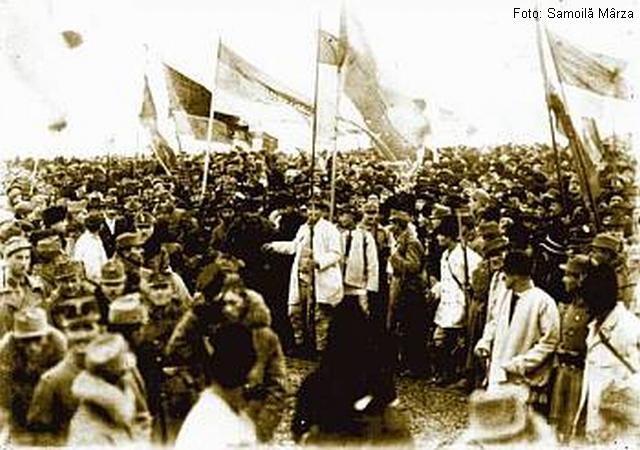Romanian political ideas around 1918
WWI brought about the Entente powers victory and a fundamental change in Europes geopolitical map.

Steliu Lambru, 30.11.2015, 13:54
WWI brought about the Entente powers’
victory and a fundamental change in Europe’s geopolitical map. New states were
born out of the ashes of the former empires, while others extended their
territory. Romania was in the winners’ camp and on December 1st
1918, together with the provinces of Bessarabia, Bukovina and Transylvania,
inhabited by a majority Romanian-speaking population, set the basis of the
Greater Romanian Kingdom.
The most important ideas that underlay
the construction of this political edifice took a clearer shape in the years of
WWI, especially in the case of the Romanians from Austria-Hungary. The
after-1918 historiography books insisted on the scope of the event and
accentuated the sacrifice of the Romanian nation for the union of all Romanians
into one single state around the figure of a monarch that embodied both
identities. The Communist regime seriously distorted the reality of December 1st
1918, turning it into a thousands-of-years struggle of an entire people to form
the unitary nation-state.
However, the ideas that accompanied the
fight for the rights of the Romanian ethnics in Austria-Hungary had a much more
convoluted history. Far from being united in their goals and means of reaching
these goals, the Romanians in Transylvania often had conflicting views on
matters related to the policies and national rights of their co-nationals. One
such case was the conflict between the newspaper Tribuna and the
National Romanian Party over the election tactics, a conflict that many saw as
fratricidal. This case was relevant for the social and political context of the
1890s, marked by the radicalism of a new generation of young intellectuals
championed by Octavian Goga and Octavian Tăslăuanu. It
was around that time that the idea emerged that while parties would divide a
nation, culture would unite it.
One of the most popular ideas was
federalism. Emerging in the first half of the 19th Century,
federalism spread quickly among the intellectuals who were seeking the
modernization of the state. In Austria-Hungary, the idea was even more
successful because the structure of that dual state allowed a reform in this
respect. Historian Răzvan Paraianu, from the Petru Maior University in Targu Mures, says
the Romanian federalist Aurel C. Popovici was among the leading Romanian
nationalist thinkers:
Aurel C. Popovici was one of the
greatest nationalists of the 19th century, and he wanted to federalize the
Austro-Hungarian Empire on a nation by nation basis. His theory was that the
central and eastern European nations could not survive by themselves caught
between what he called the great German race and the great Slavic race. Sooner
or later, Popovici said, these two would clash, and all these nations, such as
Romanians and Hungarians, would be crushed between the two great forces, the
two great races, as he called them. Popovici died before the Great War ended in
1917, in exile, at a time when Romania was in dire straits. Only at the end did
he realize that there was no hope for the empire because of the totally
uninspired policies run by the Istvan Tisza government.
The coming war precipitated things, and
radical solutions became more popular. Here is Răzvan Paraianu:
We should say that early in the war, the Tisza government had a
relatively favorable position towards Romanians, who had surprised him with
their enthusiasm for mobilization. He tended to take into consideration some
national demands. Things changed dramatically after Romania joined the war
against Austria-Hungary. At that time, many Romanians in the area of Brasov
welcomed with open arms the Romanian army. That being said, after the Romanian
army was forced to retreat, the Hungarian government had a vindictive policy
not only towards people who had shown their enthusiasm for the Romanian army
attacking the empire, but against Romanians in general. For instance, church
schools were suspended and were turned into state schools. They attempted an
ethnic conversion of the Romanian population. A lot of priests and teachers
were interned in camps, taken from home and moved, in order not to stir up
popular malcontent. Towards the end of the war, when things did not go as
planned for the Habsburg and German armies, the discontent was about to
explode. It was not the discontent of Romanians only, it was general
discontent. Bolshevik revolutions were erupting in Budapest, Vienna and
Germany. Against this background, Transylvanian Romanians started believing
that Romania had become a solution for all the chaos that an entire society and
state was sinking into.
Greater Romania formed on 1 December 1918 by the will and vote of
the National Assembly in Alba Iulia and some Transylvanian Romanian leaders such
as Iuliu Maniu, Alexandru Vaida-Voevod, Vasile Goldiş, and the leaders of the
Orthodox and Greek Catholic churches. All those statesmen saw in the new
political construction that was Romania an end to uncertainty, and hope in a
new model of state and society.





























